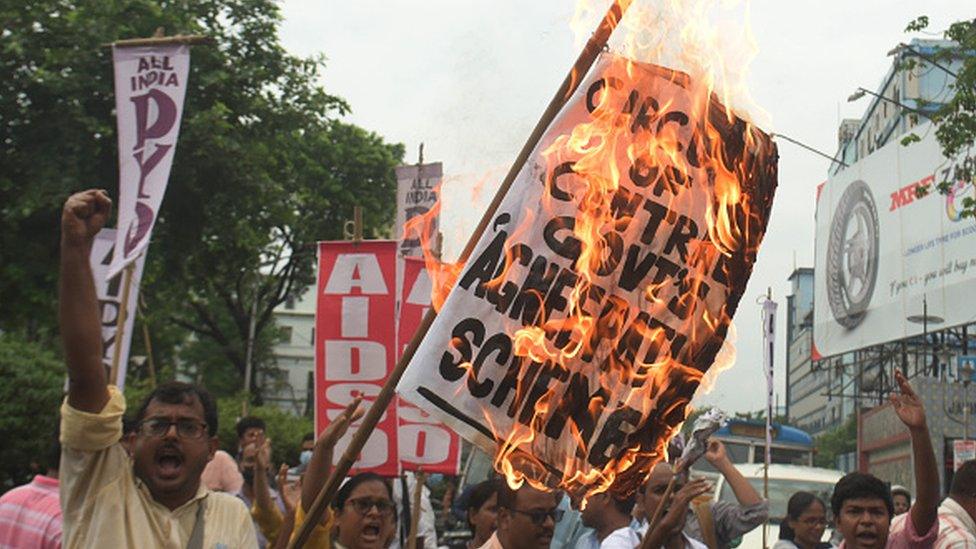Agnipath: Where Indian army job dreams are made and broken
- Published
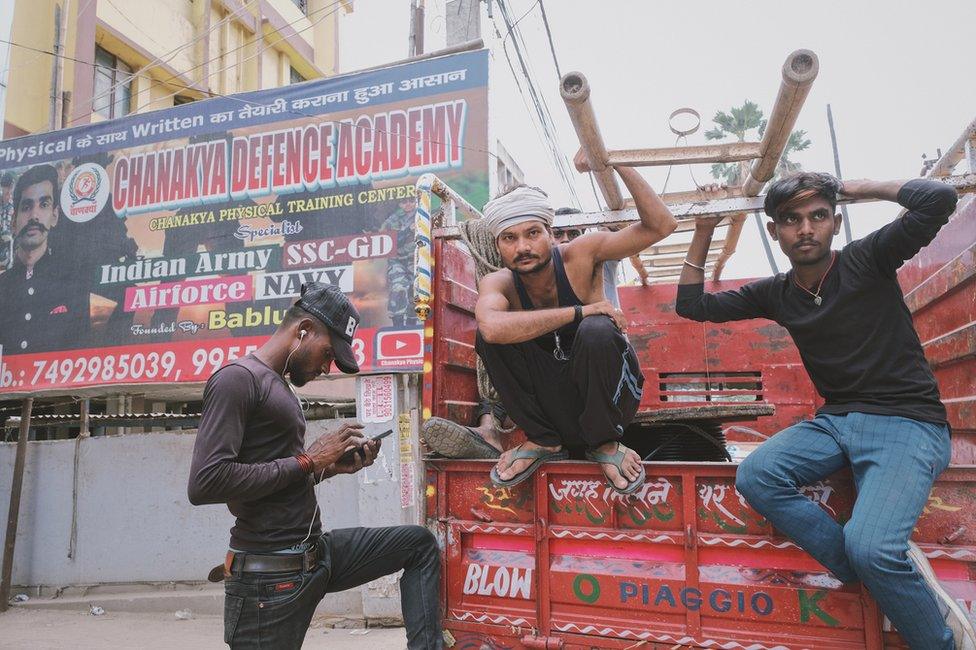
Dozens of private schools have sprung up in Patna to offer coaching to people aspiring for jobs in the defence forces
Indian cities have been roiled by protests against a new plan to hire soldiers on a fixed four-year term. Young people from smaller towns and villages prepare at private coaching centres to become soldiers as the job brings prestige, a regular income and for many, a way out of poverty. Photographer Ronny Sen offers a glimpse into such schools in the eastern state of Bihar.
In Patna, the chaotic capital of Bihar, where massive protests have taken place, dozens of private schools have sprung up over the years to offer coaching to young men and women aspiring for jobs in the defence forces and the police.
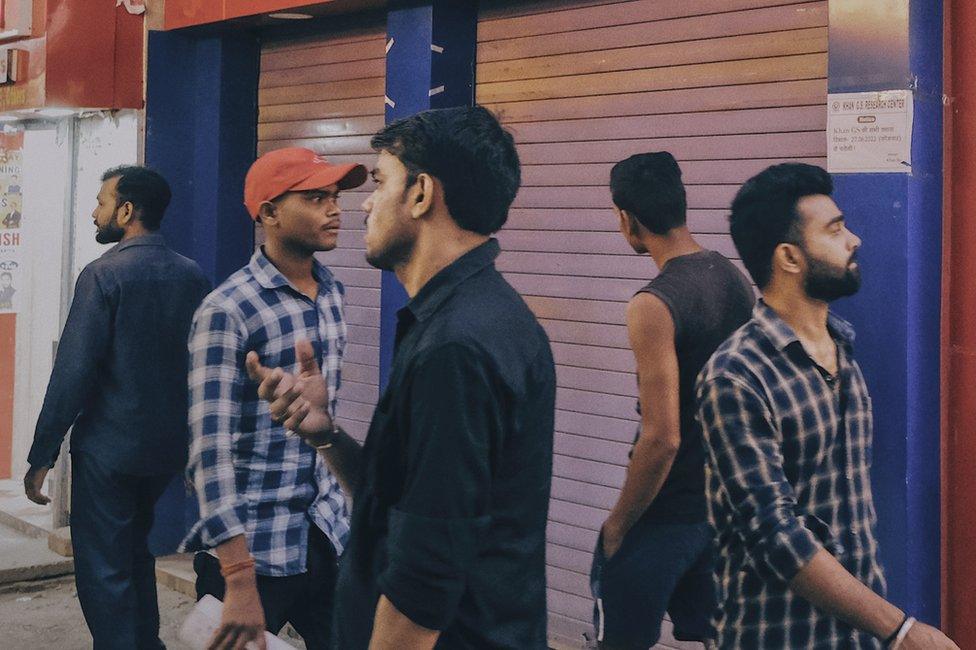
Many schools have shut temporarily after the government alleged that some of them were 'instigating' the protests
Thousands of job seekers join these unregulated schools - many of which are cramped hole-in-the-wall facilities - to prepare for these positions. Many of them are children of farmers, daily-wage workers, and retired soldiers.
In recent weeks, young protestors have taken to the streets demanding the rollback of the plan. They have blocked roads, and torched trains and vehicles.
Officials in Patna allege that many of these schools "instigated" protesters. As a result, many coaching centres have temporarily suspended their classes and some have temporarily closed down.
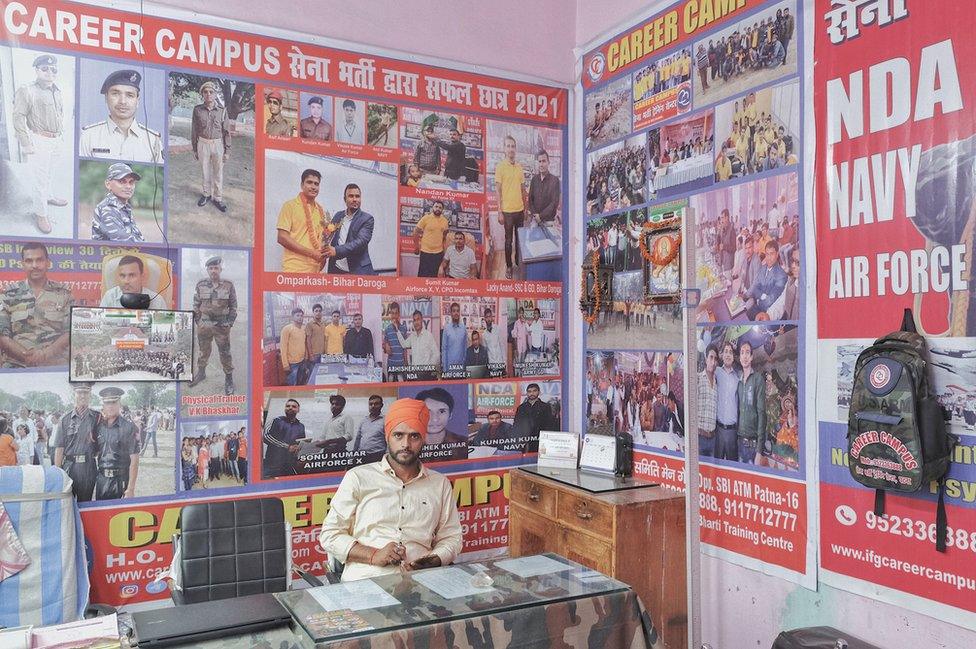
Avinash Kumar, who runs a smaller school that is open, says his six-year-old facility has about 70 students who take "written and physical" classes for jobs in the armed forces and local police. This includes 10 women, who are seeking jobs in the local police.
Mr Kumar charges 9,000 rupees ($115; £94) - bigger schools can charge up to three times higher - for five classes a week taught by eight teachers for six months. Some of his students are so poor that they pay their fees in instalments.
He has a small classroom that can accommodate 25 students. "We teach them maths, reasoning, English, and general knowledge," he says.
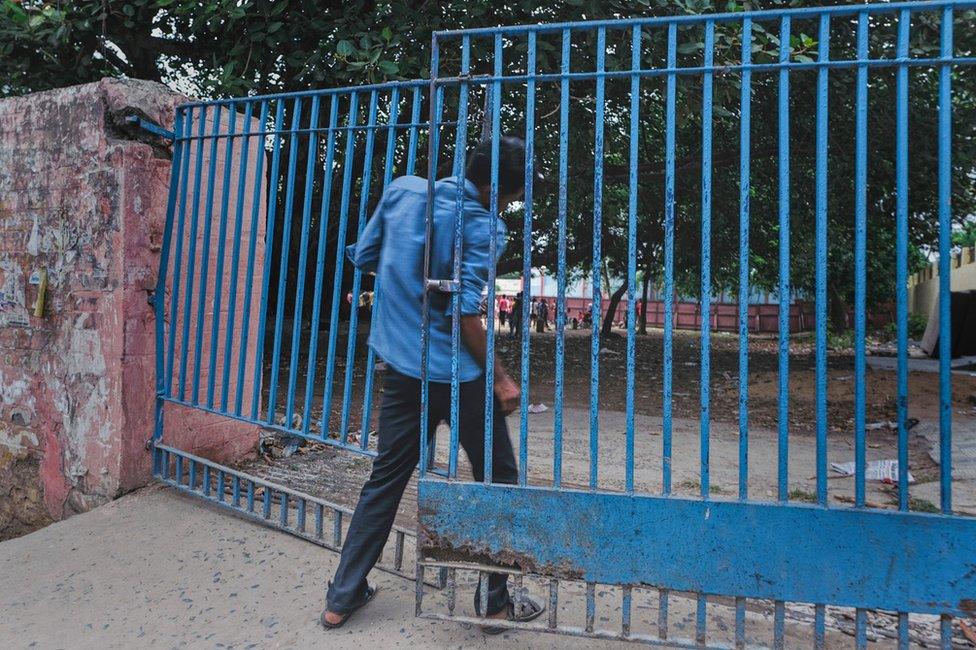
Aspirants have to squeeze through loosely locked gates of a small ground to practice for their physicals
In a space-starved city, students have to train for their physical exams at an unkempt ground which is being slowly swallowed up by a metro railway construction site.
These days, fearing unrest, schools who let the coaching schools use their small grounds have also shut their gates temporarily.
Aspirants have to squeeze through the loosely shuttered gates of the only ground available in the city to train. They also wake up at the crack of dawn when traffic is thin and practise on the city's roads.
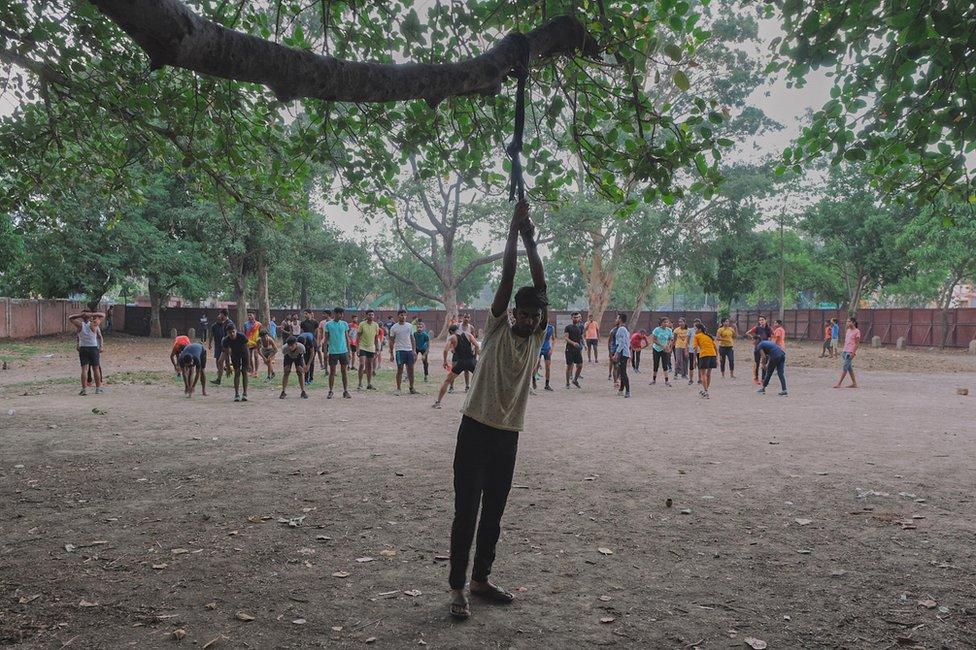
Under a large banyan tree young men train for physical tests for the defence exams
On the small ground, under a giant banyan tree, the aspirants exercise and work out as part of their training.
One of them is Yuvraj Kumar, 19, the son of a retired solder. He says he is studying commerce in college, but his first choice would be that of a soldier.
"I grew up in an army camp. I like the discipline, the uniform and the security of the job," he says.
"My father worked in the army. What we are is all due to the stability his job offered."
Mr Kumar says the move to hire contract soldiers has left him "depressed".
"But I will still take a shot at it," he says.
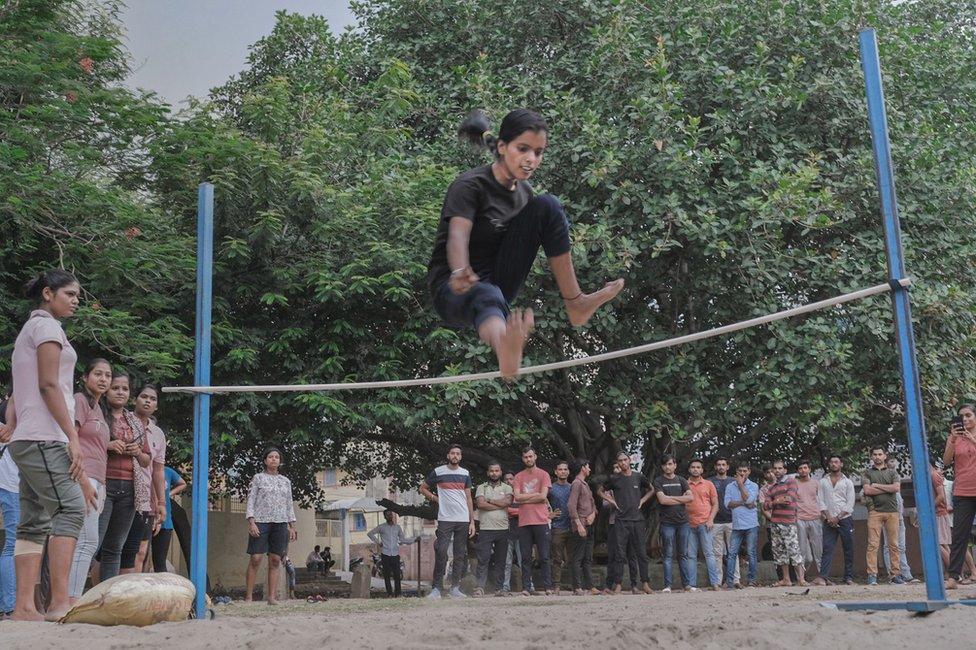
Women aspirants for police jobs train under the watchful eye of an instructor
Not far away, women from a coaching school jump over sand for jobs of sub-inspectors in the Bihar police.
Under an affirmative action plan, more than a third of the positions in Bihar's police are reserved for women. The state government claims that 25,000 women work for the force, the highest for any state in India.
A local trainer, Nikhilesh Paswan, says he trains his students for two-hour classes daily. "They teach them high jump, long jump and shot put, " he says.
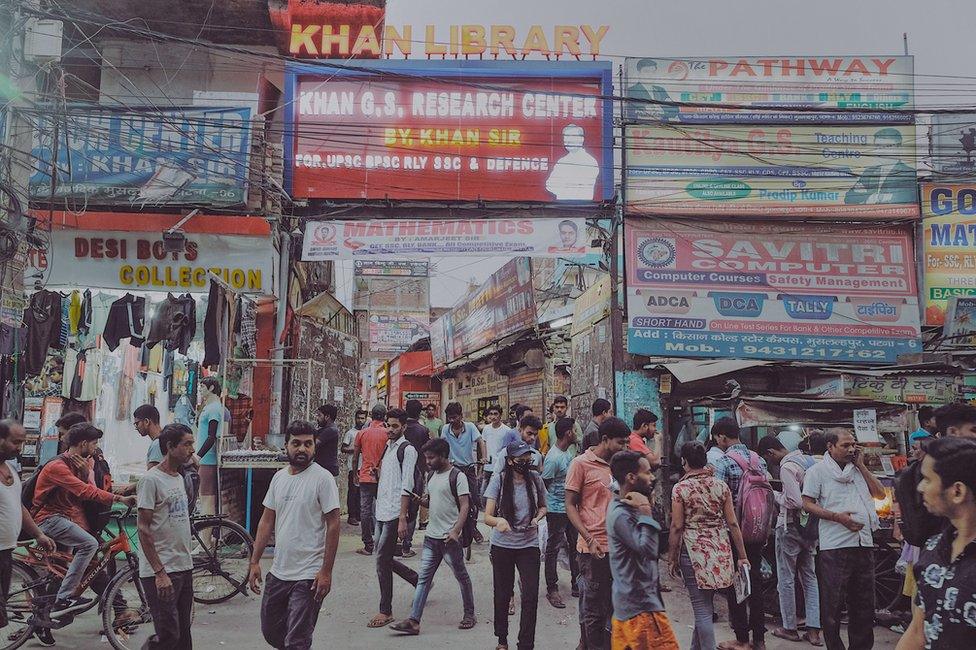
Patna's busy Musallahpur area is crowded with private coaching schools for defence - and other jobs
In the busy Musallahpur area, coaching centres for defence - and other jobs - clog the streets. Classes are held in warehouse-like dwellings and smaller areas. This is Bihar's jobs coaching hub where the young take classes to clear government exams and get a job.
But jobs are diminishing. India's unemployment rate was more than 7% in May, according to the Centre for Monitoring Indian Economy (CMIE), an independent think tank. It was more than 7% in 2020 and for most of 2021.
Even salaried jobs have shrunk. Part of this could be because firms have used the pandemic to trim their workforce and reduce costs. Studies by Azim Premji University show young workers - 15 to 23 years old - were hardest hit during the 2020 lockdown.
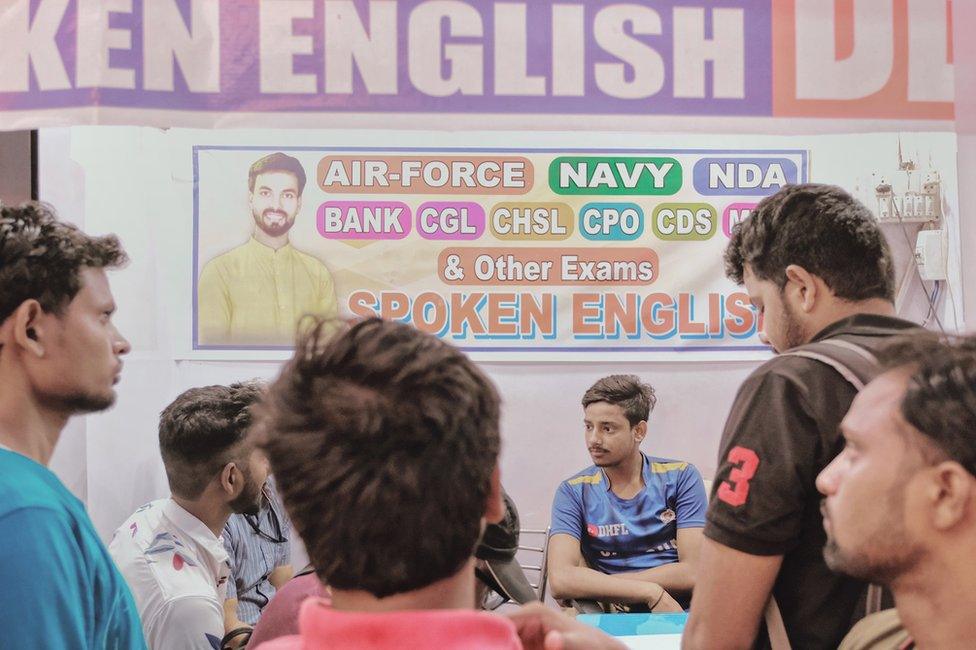
Nitish Kumar (right), who runs a small training centre, says jobs in the defence forces will now be 'like a lottery'
Not surprisingly, Nitish Kumar who runs a small coaching school in the city, says that the government's plan has unsettled most of his students.
The new Agnipath scheme is aimed at people aged between 17.5 and 21 years. It says that successful candidates will join the armed services for four years, after which only 25% of them will be retained.
The reform is aimed at cutting the army's expenditure on ballooning salaries and pensions - which consume more than half of its budget - and freeing up funds to modernise the forces
"There is so much of joblessness. There was a hiring freeze for two years. Students spent money hard earned by their struggling parents for coaching. Now they say there's no security of tenure".
"They will go ahead and sit for the exams anyway. The most secure job will now a become a lottery and gamble of sorts".
- Published11 April 2022
- Published20 June 2022
